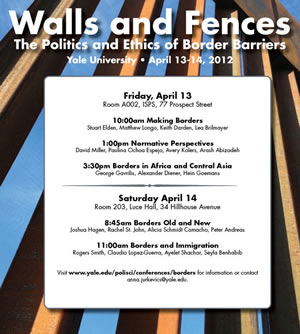
This spring, The John K. Castle Fund for Ethics and International Affairs and the Edward J. and Dorothy Kempf Fund partnered with the Council of Latin American and Iberian Studies to organize the conference “Walls and Fences: The Politics and Ethics of Border Barriers.” Professor Paulina Ochoa Espejo from the department of Political Science headed the meeting that brought together an interdisciplinary group of international scholars.
A new trend in border politics has arisen in the last decade: the erection of separation barriers. The most conspicuous of these now loom between Israel and the Occupied Territories and between the United States and Mexico. But other walls, barriers, fences, and reinforcements are being built or planned on at least thirty other international borders around the world. This trend seems to directly contradict the expectations of those economists, sociologists, and political scientists who in the 1980s and 1990s claimed that globalization implied the waning of sovereignty and the emergence of a borderless world. So, in the last decade, students of borders have sought to understand why territorial borders have again become the object of political concern.
The conference brought together legal scholars, geographers, political scientists, political theorists, historians and philosophers from the United States, the United Kingdom, Mexico and Canada to debate, from a normative perspective, why territorial borders have become so politicized in recent years. Do border barriers serve their purpose? What precisely is the moral problem, if any, with border walls and border fences? These questions are particularly exciting in an interdisciplinary setting: Discussions ranged from problems of territorial rights and jurisdiction in the Middle East, border management between Turkmenistan and Tajikistan, the origins of conflict around border territories in Africa and the genesis of the Mexico-U.S. border, to the ethical implications of closing and opening borders to immigrants and other foreigners.
